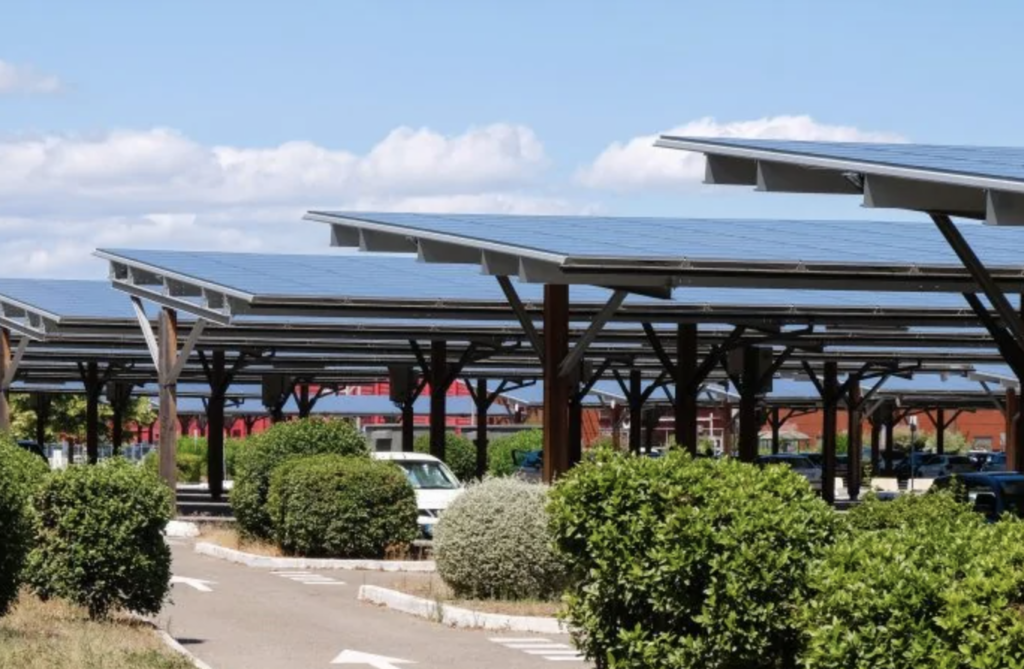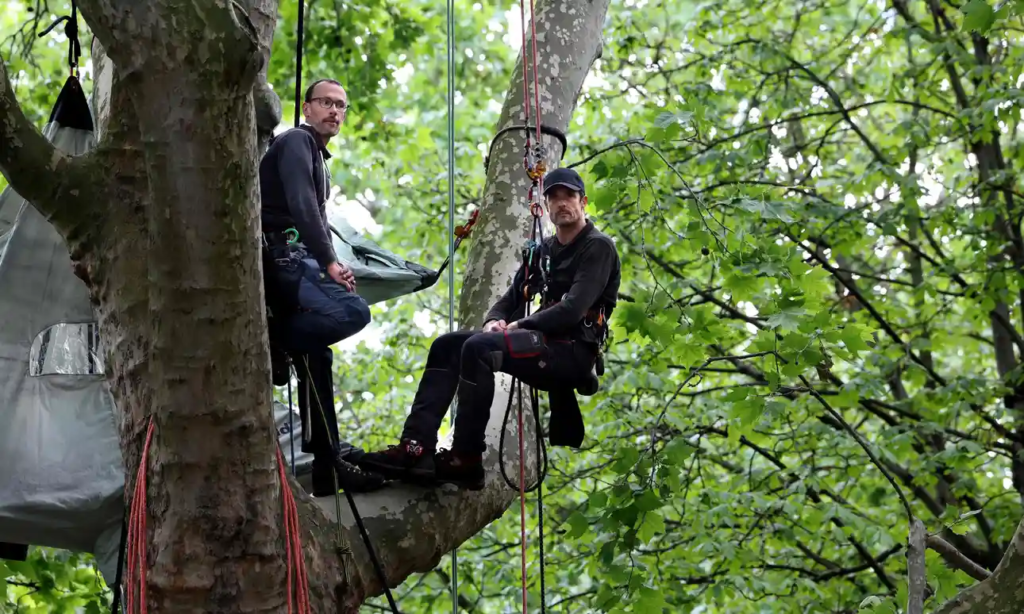Editor’s Note From Rivera Sun
At a time when the climate crisis seems bleak, here is a reminder of the many successes won by the climate justice movement this year. Many of these are the fruition of years-long struggles. Others are swift and effective campaigns that show how we can push for change at high speed. All of them illustrate that resistance is not futile, the situation is not hopeless, and our best bet for a livable future is to join these nonviolent campaigns. I also encourage you to check out the 2021 version of this special report to get a double dose of how much can be accomplished in just a few short years.
In the 2022 Special Report, you’ll find 76 stories that highlight victories for climate, successes in repairing ecosystems or protecting species, and much more. There are stories about fossil fuel projects being cancelled, blocked, and in a few cases, overturned. You can read about the surge of renewables. (Special congratulations to Greece and Stanford University for hitting 100% renewable energy this year.) You’ll discover how India, Ireland, Ecuador, and Native Americans took bold steps to recognize and uphold the Rights of Nature.
Across the world, people are drawing a line in the sand and holding back the onslaught of toxic plants, carbon emissions, and pollution. They’re building out the renewable future – though not without some major challenges. They’re keeping species from the brink of extinction and restoring marshes, lakes, and more. I’ve also included a small sampling of the many stories about how judges are acquitting climate activists of charges. In a few notable cases, the judges themselves are recognizing that the laws protect a dangerous status quo that threatens all of life on earth.
I hope these stories remind you of what is possible … and help you move into action in 2023 with renewed conviction that what we do right now matters to all of the future beings yet to come.
In solidarity,
Rivera Sun
Photo Credit: Climate activists march during an Extinction Rebellion Global Action.
Love these special reports? Donate today to keep them coming>>


FOSSIL FUEL DEFEATS
Another Win for South Africa’s Indigenous Communities: Indigenous communities from the Wild Coast of South Africa’s Eastern Cape have attained a landmark legal victory against energy and petroleum giant Shell. The victory has been hailed as a major breakthrough in the effort to stem the tide of climate change. Read more>>
In ‘Huge Victory’ for Planet, Norway’s Equinor Abandons Arctic Oil Field Plans: Climate campaigners in Norway applauded Thursday as state-owned energy giant Equinor announced it would postpone plans to develop an oil field in the Arctic Ocean, as analysts suggested the proposal will likely be put aside indefinitely. Equinor said the proposed Wisting oil field, which would have been its fourth hydrocarbon project in the Arctic, has grown too expensive due to global inflation and supply chain issues—but campaigners credited sustained pressure as a factor that pushed the company to abandon the project. Read more>>
Starving Big Oil Of New Talent – Young People Are Steering Clear Of Oil Jobs: Big Oil is becoming stigmatized as awareness grows that its environmentally-friendly messaging, full of beautiful landscapes and far-off promises to erase (some) of its emissions, doesn’t match its actions. Well over half of millennials say they would avoid working in an industry with a negative image, according to a survey in 2020, with oil and gas topping the list as the most unappealing. With floods, fires, and smoke growing noticeably worse, young people have plenty of reasons to avoid working for the brands that brought you climate change. Read more>>
University Of Washington Moves To Divest From Fossil Fuels: After more than two years of pressure from student climate activists at the University of Washington, the University’s Board of Regents passed a resolution to divest the school’s endowment, worth more than $6B, from the fossil fuel industry. The resolution, released last Friday, would move investments of around $124 million currently funding fossil fuel projects into “climate solutions.” Read more>>
The Pacific Northwest Has Defeated Dozens Of Fossil Fuel Projects: New large-scale fossil fuel projects have become mostly unworkable in the Pacific Northwest, with dozens canceled over the past decade due to fierce opposition from local communities. Since 2012, an estimated 55 coal, oil, and natural gas projects have been proposed for the Pacific Northwest — encompassing Oregon and Washington, as well as British Columbia. But more than 70 percent of them have been defeated. Read more>>

Unrelenting Opposition Wins Fracking Project Cancellation In Australia: First Nations and climate campaigners say oil and gas giant Origin Energy’s decision to pull out of exploring and fracking in three important natural jewels is testament to the effectiveness of a grassroots campaign led by Traditional Owners, who refused to accept the company’s attempts to destroy land and water. Read more>>
Court Blocks Oil Exploration and Underwater Seismic Testing Off South Africa’s ‘Wild Coast’: A judge found that Shell and Impact Africa had failed to engage in a “genuine, bona fide substantive two-way process” with Indigenous tribes “aimed at achieving, as far as possible, consensus.” This ruling comes amidst a grassroots campaign to stop the seismic testing. Read more>>
Pennsylvania County Bans Fracking in Area Parks: Eight years after allowing a shale gas company to drill beneath Deer Lakes County Park for methane gas, the Pennsylvania county home to Pittsburgh has banned all industrial activity in the area’s eight other parks — despite a veto from the county executive. Read more>>
KXL Is Officially Dead: TC Energy just announced the final nail in the coffin for the Keystone XL pipeline project. Over the years an unlikely coalition of Tribal Nations, farmers and ranchers, and nonprofit groups joined together to fight back against the threat that this project posed to our homelands, water, and people. It brought to light issues of Tribal sovereignty, free, prior, informed consent, water rights, eminent domain and set a precedent of how to fight back against big oil pipelines. Learn more>>

Global PR Firm Cuts Ties With Bank Over African Oil Project: Public relations giant Edelman and Standard Bank Group are ending their relationship, reportedly due to a controversial oil project—a development that climate campaigners on Thursday welcomed as a win for activism pressuring PR firms to break up with polluters. Celebrating the move, a StopEACOP activist said that “the climate crisis is not only enabled by the fossil fuel companies but those who provide the financing and those that help shape their narrative.” Read more>>
Extinction Rebellion Convinces Shell Oil Senior Safety Consultant To Quit: Shell’s senior safety consultant gives her resignation after seeing our action at Shell’s London HQ in April, where XR’s TruthTeller team asked individual employees to #JumpShip. Read more>>
Biden Cancels Three Off-Shore Oil & Gas Leases In Alaska and Gulf Coast: The Biden administration says it is canceling three oil and gas lease sales scheduled in the Gulf of Mexico and off the coast of Alaska, removing millions of acres from possible drilling. Read more>>
Hawaii Legislature Calls For Fossil Fuel Non-Proliferation Treaty: Hawaii lawmakers put the state on the path to making history after the Legislature passed a resolution Thursday endorsing a document called the “Fossil Fuel Non-Proliferation Treaty.” “Let us hope this triggers other states to help generate the momentum for a wave of international cooperation to end the era of deadly fossil fuels.” Read more>>

Oil Companies Pull Out of Drilling In Arctic National Wildlife Refuge: Drilling in the refuge has long been a controversial issue, as the 19.5-million-acre wilderness area is home to 45 species of mammals including polar bears, bowhead whales and caribou and considered sacred by the Indigenous Gwich’in people, according to the Gwich’in Steering Committee. “These exits clearly demonstrate that international companies recognize what we have known all along: drilling in the Arctic Refuge is not worth the economic risk and liability that results from development on sacred lands without the consent of Indigenous Peoples,” the Gwich’in Steering Committee said. Read more>>
Victory — Finally — Against The Longest Oil Spill In U.S. History: At the time of the 2004 spill, Taylor Energy downplayed the extent of the leak, claiming it was less than 3 gallons of oil per day. The truth was much worse: as much as 29,274 gallons per day were flowing into the ocean. Now, the company must pay to clean up its mess. Read more>>
Britain Moves Ahead With Mandatory Climate Plans For Companies: Britain unveiled a new task force to write rules forcing financial firms and listed companies to publish plans from next year for transitioning to a net zero economy by 2050. Read more>>
Fossil Fuel Recruiters Banned From College Careers Service Center: Fossil fuel companies have been banned from recruiting students through a university careers service for the first time. The new policy from Birkbeck, University of London, states its careers service “will not hold relationships of any kind with oil, gas or mining companies”. The decision follows a campaign, supported by the student-led group People & Planet, to cut off recruitment pathways to fossil fuel companies. The campaign is now active in dozens of UK universities. Read more>>

Argentine Climate Activists Win Suspension of Offshore Oil Exploration: Days after the Global Coastal Rebellion that saw an alliance of activists rise up to protect their oceans from extraction, an Argentinian court suspended all oil exploration off the country’s coast. Read more>>
American International Group (AIG) Will Stop Insuring Coal, Tar Sands, And Arctic Drilling: Climate justice advocates celebrated Tuesday in response to insurance giant AIG’s announcement that it will no longer invest in or provide insurance coverage for any new Arctic drilling activities nor will it finance or underwrite the construction of any new coal-fired power plants, thermal coal mines, or tar sands projects, effective immediately. Read more>>
Federal Court Rejects Massive Montana Coal Mine Expansion: Citing the impacts of coal mining to clean water and water supplies in the Yellowstone River, a federal judge late last week preliminarily ruled the Trump administration illegally approved an expansion of the Rosebud strip mine in southeast Montana. Read more>>
Activist Pressure Pauses New Jersey Pipeline: Faced with strident opposition from community and climate activists, New Jersey Gov. Phil Murphy on Thursday intervened to stop a vote on a controversial fracked gas power plant in Newark pending further review of the project’s environmental impact. Read more>>

How Indigenous Grandmothers Stopped A Gas Pipeline: Alton Gas finally abandoned a project that would have pumped 10,000 cubic metres of brine into the mouth of the Stewiacke River in the middle of Nova Scotia, leaving behind subterranean caverns where the company planned to store natural gas. For seven years Mi’kmaq grandmothers worked to stop the plan. They succeeded. Read more>>
Succumbing To Protests, Serbian Government Revokes Permits For Rio Tinto Mining Project: Serbian prime minister Ana Brnabic announced that the government has abolished all legislation, permits and regulations related to Rio Tinto and the Working Group on Implementation of its mining project in the country. Serbia saw massive protests last year by environmental activists and opposition parties against the proposed opening of a lithium mine. Read more>>
‘Big News’ for Climate As Global Insurance Giant Shifts Away From Fossil Fuels: After Swiss Re, the world’s second-largest reinsurer, announced that it is moving to end coverage for most new oil and gas projects, climate justice campaigners who have long pushed for the insurance industry to shift away from fossil fuels offered cautious praise. The new policy by Swiss Re “is not perfect yet,” said one campaigner, but the world’s second-largest reinsurer “is headed in the right direction.” Read more>>
Massive US Off-Shore Oil Leases Invalidated By Court: Today, the D.C. District Court invalidated the Department of Interior’s decision to offer 80 million acres in the Gulf of Mexico for oil and gas leasing, marking a pivotal victory in the fight to defend Gulf communities and the planet from the worsening climate crisis. The Court held that Interior failed to accurately disclose and consider the greenhouse gas emissions that would result from the lease sale, violating a bedrock environmental law. Read more>>
RENEWABLES

Every Large Parking Lot in France Will Soon Be Covered in Solar Panels: A mandate to blanket the asphalt in photovoltaics could provide as much energy as 10 nuclear power plants. Read more>>
Greece Reached 100% Renewable Last Week: In a historic first, Greece met 100 percent of its electricity demand with renewables last week. According to the country’s Independent Power Transmission Operator, or IPTO, clean-energy technologies like wind, solar, and hydroelectricity generated a record-high 3,106 megawatts on October 7 and powered the entire country for a five-hour window. Read more>>
US Authorities Agree To Rip Up Grass Lawns For Water Conservation: A group of agencies that provide water to millions of customers in the western U.S. has agreed to rip-up grass lawns in public spaces across multiple states as part of an effort to reduce water usage as the Colorado River continues to suffer from a major drought. More than 30 agencies that draw water from the river signed on to the conservation agreement last week. The pledge promises to remove 30% of grass lawns and replace them with “drought- and climate-resilient landscaping while maintaining vital urban landscapes and tree canopies,” that benefit communities and wildlife. Read more>>
All-Electric Community Powered By Solar And Battery Microgrid Launches: A new collection of Energy-Smart Connected Communities — more than 200 homes powered entirely by solar energy — are being built in Menifee, California, and are the first of their kind in the Golden State. A $6.65 million grant from the Department of Energy helped fund the building of the homes. Read more>>
How This Solar Town Survived Hurricane Ian Shows the Promise of a Green Energy Future: The Babcock Ranch community near Ft Meyers shows building a resilient and low-carbon America will save both money and lives. We need to start now. Read more>>
Cars Are Vanishing From Paris Streets: Under Mayor Hidalgo, Paris has done as much as any city in the world to reduce car traffic and use amid a growing awareness of the damaging impact they have on cities. Over recent years, Paris has implemented an array of measures to prioritize pedestrians, cyclists and transit while bringing car use screeching to a halt. Read more>>
California Moves Toward 100% New Zero Emissions Vehicles By 2035: On Aug. 25, California regulators adopted rules that would ban the sale of new gasoline-powered cars and light trucks by 2035. The states are joining New York, which passed a similar law last year banning the sale of gasoline-powered cars and light trucks by 2035, and then expanding the ban to cover heavy trucks by 2045. Read more>>

This Historic Community Is Pushing the Nation Toward a Wind Power Revolution: Block Island, Rhode Island, off the New England coast, overcame political strife to lead the way on energy independence. They shut down an obnoxious diesel generator system and became one of the first communities in the US to run entirely on wind power. Read more>>
US Postal Service To Boost Electric Vehicle Purchases After Backlash: Pressure from progressive advocacy groups and lawmakers bore fruit on Wednesday when the U.S. Postal Service announced that it would be making 40% of its new delivery vehicles electric, up from Postmaster General Louis DeJoy’s initial plan to electrify just 10% of the mail agency’s aging fleet. Over 500,000 emails, letters, and petition signers spoke up for electrification. Read more>>
Offshore Wind Installations Surged Threefold Last Year: In 2021, countries connected 21.1 gigawatts of offshore wind energy to the grid, which was triple the amount in 2020, according to a new report from an industry group. The growth in offshore wind is happening as countries adopt clean energy policies to support development and as equipment costs decline, as Maria Gallucci reports for Canary Media. The growth in 2021 brought the cumulative total to 56 gigawatts, less than 1 percent of which is in U.S. waters. China was the leader in new construction last year, while the United States has many big projects in various phases of development, but has yet to complete any of them. Read more>>
Clean Car Trade-In For New Zealand Families: New Zealand has announced a new program to help low- and middle-income families trade in their gasoline-powered cars for cleaner hybrid or electric vehicles. Read more>>
Stanford Reaches 100% Renewables: Stanford University’s second solar generating plant went online this month, completing the university’s years-long transition to 100 percent renewable electricity and marking a major milestone in its larger journey to reach net zero carbon emissions on campus. Read more>>
Chrysler Plans To Go All-Electric By 2028: Chrysler plans go all electric by 2028, the latest automaker to announce a shift away from gasoline-powered engines under rising pressure to act on climate change. The company said Wednesday that it will launch its first electric vehicle by 2025. Chrysler announced its electric plans along with a new AI-enabled vehicle system powered by a battery that it says can travel 350 to 400 miles (563 to 644 kilometers) per charge. Read more>>
RIGHTS OF NATURE

Indian Court Rules That Nature Has Legal Status on Par With Humans—and That Humans Are Required to Protect It: The highest court in one of India’s 28 states ruled last month that “Mother Nature” has the same legal status as a human being, which includes “all corresponding rights, duties and liabilities of a living person.” The court also said that the natural environment is part of the human right to life, and that humans have an environmental duty to future generations. Read more>>
Celebrating Victories in Europe and South America, the Rights of Nature Movement Plots Strategy in a Time of ‘Crises’: A global alliance formed in 2010 to advance an unorthodox legal theory that ecosystems and wild animals have rights, similar to humans. Now, says one leader, those ideas are “legitimate subjects of debate.” Read more>>
National Congress of American Indians Adopts Resolution The Rights of Nature: The resolution, developed by Menīkānaehkem and the Center for Democratic and Environmental Rights, asserts that Indigenous Peoples “authority and ability … to protect the natural environment is essential to our inherent sovereignty and self-determination,” an ability at risk “from the many environmental crises that we face today,” and exacerbated by “environmental laws [that] treat nature and Mother Earth as a non-living entity existing for human use.” Read more>>
Ecuador Gives Legal Rights to Wild Animals: The highest court in Ecuador has ruled in favor of wild animals. A case for Estrellita, a woolly monkey taken from the wild and kept as a pet, is the first case to apply the country’s “rights of nature” law to animals. Read more>>
Donegal County Council Votes Unanimously To Adopt Rights of Nature: The Donegal County Council in Ireland voted unanimously to adopt the Rights of Nature as “an important statement of intention that imbeds the concept as a core value and a keystone concept.” Read more>>
PROTECTED

Paris Protesters Celebrate Saving Trees Around The Eiffel Tower: Protesters in Paris are celebrating having saved more than 40 trees – one of them over 200 years old – from being chopped down or threatened with damage around the Eiffel Tower as part of a €72m scheme to create a huge garden. After weeks of protest including a hunger strike, Paris officials initially said they would consider the fate of the trees on a “case by case” basis. Now they have conceded that the “extreme sensitivity” of cutting the trees down has persuaded them to abandon the idea altogether. Read more>>
‘Amazing News’ – Historic Shark Protections Approved at Global Wildlife Convention: Up to 90% of sharks targeted by the lucrative fin trade will now be protected, said one advocate. The new rules cover species that are not yet threatened with extinction but which could rapidly become more endangered without strong controls. Read more>>
Tribes Halt Rosemont Mine In Arizona (Again): Construction of the mine, called Rosemont, would have destroyed the ancient village and burial grounds of the Hohokam people, ancestors of modern Tribes who lived and farmed the deserts of Southwestern Arizona. Read more>>
Safe Roads and Wildlife Protection Act Passed: California Gov. Gavin Newsom signed into law the Safe Roads and Wildlife Protection Act. This crucial law directs state agencies to include wildlife crossings when building or improving highways. It will help reduce vehicle collisions that can be deadly for wildlife like mountain lions, elk and deer — and people, too. Read more>>
What Lula’s Stunning Victory Means For The Imperiled Amazon Rainforest: Under President Bolsonaro, deforestation accelerated, threatening not only wildlife and Indigenous communities but also the global climate. But Lula has promised to give the forest a second chance. Lula often points to his track record to prove he can succeed: During his presidency, deforestation in the Brazilian Amazon fell by more than 80 percent, meaning there was less forest loss. An analysis by the climate website Carbon Brief suggests that under Lula’s next administration, annual deforestation in the Brazilian Amazon could be down by nearly 90 percent by the end of the decade. Read more>>
‘Win for Wildlife’ as Federal Court Restores Endangered Species Protections Gutted by Trump: “In the midst of a global extinction crisis, the court’s decision to vacate the rules will help ensure that imperiled species receive the protections they desperately need,” said one advocate. Read more>>
Iceland To Hang Up Her Harpoons For Good, Issuing No More Whaling Permits: Whales off the coast of Iceland will be left alone by the end of next year after the nation’s Fisheries Minister announced a cancelation of all new permits for commercial whaling. Read more>>
How a Battle for a Piece of Forest in Nova Scotia Echoes the Global War for Our Biosphere: In Nova Scotia, vital ecosystems have been under attack by extractive or exploitative industries for decades. Recently, a hard-fought battle succeeded in stopping the development of a precious piece of land on the eastern shore of the province. It shows that these battles can be won, but we must unite to fight them, and we must do it now before the madness of ecocide ends with the finality of extinction. Read more>>
REGENERATION & RESTORATION

The Community That Welcomed Back A Marsh: Near the community of Selsey, England, saltwater marsh and other coastal ecosystems have been allowed to reclaim what was farmland and is now known as the Medmerry Nature Reserve. It aims to counter the poor development choices that put communities at risk of flooding. Read more>>
How Decades of Hard-Earned Protections and Restoration Reversed the Collapse of California’s Treasured Mono Lake: Stream rehabilitation and limits on water diversions saved a crucial feeding stop for migratory birds. The lake is now an inspiration for efforts to heal degraded and warming ecosystems around the world. Read more>>
Yes, You Can Save Lives By Planting Trees, A New Study Says: Increasing urban greenery could save lives of tens of thousands of older adults, researchers found. They looked at 35 metropolitan areas within the U.S. and compared satellite data showing changes in how much greenery a city had with mortality data for people aged 65 and older from 2000 to 2019. Using these measures, they estimated that even small increases in greenery could have saved over 34,000 lives over the past two decades. Read more>>
How One Town Put Politics Aside To Prevent Forest Fires: Timber Wars tore this town apart. Wildfire prevention brought it back together. Read more>>
Shoring Up Coastlines And Communities With Green Infrastructure: When the natural world inspires engineering projects, the results can both protect us from climate impacts and center the needs of frontline communities. Read more>>
Three Bird Species Are Bouncing Back In The British Isles: Heralded as conservation success stories, these birds have come back from the brink and offer hope for other rewilding projects. Read more>>
POLLUTION

Women Win Decades-Long Clean Air Battle In Chile’s Own ‘Chernobyl’: Activists in Quintero-Puchuncaví Bay ‘sacrifice zone’ hail closure of Codelco plant that poisoned their community. Their calls for environmental justice in the polluted Quintero-Puchuncaví Bay area of central Chile have largely gone unheard – until now. On 17 June, the government of the newly elected president Gabriel Boric announced that a smelting plant run by the state-owned National Copper Corporation of Chile (Codelco) would close. It followed a serious pollution incident that affected scores of people in this heavily industrialized area next to the Pacific Ocean. Read more>>
Dimock, PA, Wins Clean Water From Polluting Frackers: Over a decade ago, a small town in northwest Pennsylvania became the focal point for the anti-fracking movement. Soon after Cabot Oil & Gas (now owned by Coterra) came to Dimock, residents noticed that their water had turned brown from contamination and was no longer safe to drink. The fracking company denied responsibility, and state and federal regulators did little to help residents. Finally, after 14 years of grassroots organizing, some justice came to those affected by this fracking nightmare. Read more>>
Formosa Plastics Plant Thwarted: Today, Louisiana’s 19th Judicial District Court reversed the Louisiana Department of Environmental Quality’s (LDEQ) decision to issue air permits that Formosa Plastics needed to build its proposed petrochemical complex in St. James Parish. The decision throws out the air permits and sends Formosa Plastics back to the drawing board. The permits would have allowed Formosa Plastics to emit over 800 tons of toxic pollution into the air, exacerbating environmental racism and harming the health of St. James’ predominantly Black residents in a region known as “Cancer Alley.” Read more>>
Massachusetts Ends Subsidies For Wood-Fired Power Plants: Environmental groups today celebrated the enactment of Massachusetts’ new climate law, An Act Driving Clean Energy and Offshore Wind, which will expand clean energy development and end renewable energy subsidies for wood-burning power plants. The new law makes Massachusetts the first state in the nation to remove woody biomass from its Renewable Energy Portfolio Standard (RPS). Read more>>
Canceled Hydrogen Project Should Be A Lesson For All Toxic Polluters: A “green” hydrogen plant company withdrew its permit application after climate, health, and social justice groups, including Beyond Toxics, petitioned the Oregon Public Utility Commission to reject the proposal to install a multimillion-dollar electrolyzer to create hydrogen that would have been blended into gas and then piped into a working-class area in Eugene. Read more>>
European Union Announces Plan To Cut Pesticide Use In Half: The European Commission has proposed a new law that would cut pesticide use in half by 2030 and completely ban the use of these chemicals near schools, playgrounds and hospitals. The proposal is part of a larger set of goals to reverse biodiversity loss and restore 20% of land and seas by the end of the decade. Read more>>

“Solidarity Is How We Win” – After Years of Fighting Toxic Scrapyard, Activists Celebrate a Victory in Chicago: By protesting and going out on hunger strike, environmental justice advocates helped stop a controversial metal scrapper from being built on Chicago’s Southeast Side. Read more>>
Volunteer Divers Clear Tons of Ghost Nets From Greek Coastline: The beautiful Greek island of Ithaca is currently playing host to two groups of divers on a special mission: to clear the sea of defunct or ‘ghost’ fishing nets and equipment. Normally these nets are left by local fishermen. But in the clear waters off this particular island, which was the birthplace of Homer, the problem is on a more industrial scale. The volunteers are faced with debris from two fish farms that were abandoned a decade ago, posing a potential ecological disaster. Read more>>
California Passes Nation’s Toughest Plastic Reduction Bill: The Plastic Pollution Producer Responsibility Act, widely considered the “strongest” plastic reduction policy in the nation, requires a 25 percent reduction of single-use plastic packaging and foodware — both by weight and by the number of items — within the next 10 years. Experts say the bill could prevent 23 million tons of plastic pollution by 2032. Read more>>
Small Maine Town Ban Industrial Metal Mining: In a David and Goliath story, a tiny town in coastal Maine stopped a silver mine, arguing that no amount of precious metals is worth pollution, contamination, and poisoned water. Read more>>
Victory for O’ahu Water Protectors – Pentagon To Shut Down Leaking Fuel Tank: After widespread citizen organizing and protest, the US Defense Department has agreed to permanently shut down the Navy’s massive fuel tank facility in Hawaii that leaked petroleum into Pearl Harbor’s tap water, and will remove all the fuel. Read more>> Editor’s Note: They are still working for a full clean-up.
That’s A Wrap – French Plastic Packaging Ban For Fruit And Veggies Begins: A law banning plastic packaging for large numbers of fruits and vegetables comes into force in France on New Year’s Day, to end what the government has called the “aberration” of overwrapped carrots, apples and bananas, as environmental campaigners and exasperated shoppers urge other countries to do the same. Read more>>
COURTS & ACQUITTALS

In the Philippines, a Landmark Finding Moves Fossil Fuel Companies’ Climate Liability into the Realm of Human Rights: In a damning and lucidly-written report, the commission found that the world’s largest fossil fuel companies had “engaged in willful obfuscation and obstruction to prevent meaningful climate action.” The companies continue to deny climate science and try to slow a transition away from fossil fuels, the report said, driven “not by ignorance, but by greed.” While not binding, the findings of the report by the country’s Commission on Human Rights has broad implications for other cases, experts say. Read more>>
Legal Victory For Arrested Line 3 Pipeline Activists: Opponents of Line 3 on Tuesday welcomed a Minnesota judge’s dismissal of all charges against five water protectors arrested last year for protesting plans to have the tar sands pipeline cross the Shell River in several places. Read more>>
Judge Dismisses Charges Against Three Enbridge Line 3 Pipeline Protestors: A White Earth Tribal judge dismisses charges against three Indigenous people involved in Enbridge line three pipeline protests. Nancy Beaulieu, Justin Keezer and Todd Thompson were charged with criminal trespassing at an eight day ceremonial camp at Fire Light camp. It is on land above where Enbridge Energy built the pipeline. White Earth Court Judge David DeGroat says the protestors’ actions “were lawful exercises of sovereign Indigenous rights reserved in an 1855 Treaty and protected nonviolent direct action pursuant to the White Earth Tribal Code.” Read more>>
Line 3 Protesters Win Protective Ruling Against Government Repression: Indigenous Water Protectors celebrated a court ruling against police harassment of their protest camp. Hubbard County District Judge Jana Austad issued a ruling shielding the Indigenous-led Giniw Collective’s Camp Namewag — where opponents organize resistance to Enbridge’s Line 3 tar sands pipeline — from local law enforcement’s unlawful blockades and harassment. Read more>>
Activists Are Using the “Climate Necessity Defense” in Court — And Winning: The Climate Defense Project’s engagement in the arena of climate necessity defense has also yielded dramatically tangible court victories, especially remarkable given the relatively short time the team has been working at what has been thought of as a pretty obscure legal argument — even kind of “out there.” Read more>>
Climate Activists Acquitted After Train Protest: Jurors on Friday unanimously acquitted three Extinction Rebellion activists who were on trial for blocking a train in London to demand an adequate response to the life-threatening climate emergency. “There is mounting evidence from the courts and in particular from juries that the public is taking the climate crisis… far more seriously than government and business.” Read more>>
London Jury Acquits Three Extinction Rebellion Activists: Three Extinction Rebellion activists who disrupted a London train during rush hour were acquitted by a jury Friday. ”When a jury hears the truth about the escalating climate crisis, with the depth and seriousness they won’t get from the government or the media, they understand the urgent need to act.” Read more>>


